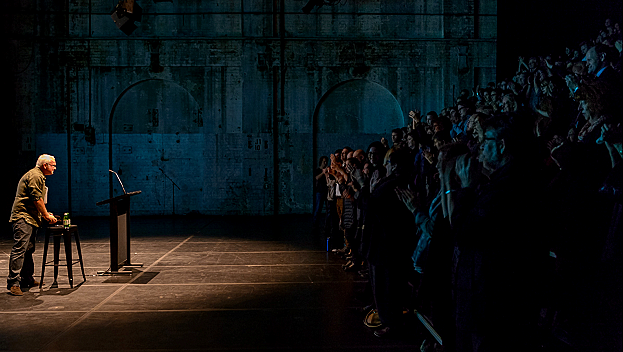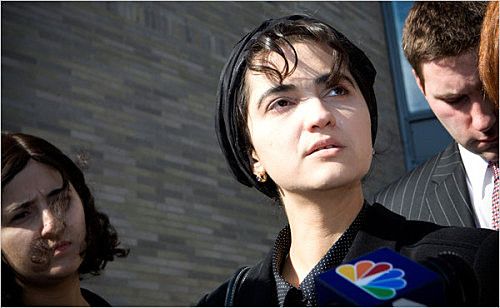Internet Histories | 28 July
This week on the internet: the pleasures of the NZIFF, metadata from a metagame, trawling the New Yorker's archives and the stories white Australia allows itself to be told.
This fortnight:
NZIFF pleasures | Trawling The New Yorker's archives
White Australia's stories
Jose
When I sat down in my seat at a International Film Festival screening the bloke next to me turned leaned over and asked: “Do you go and see normal films as well?” One of the joys of the NZIFF is the chance to watch films which piss all over accepted conventions: films that are incomprehensible, long and ripe with a filmmaker's vision … even if it’s a vision that’s currently floating around Neptune. The great Aleksei German’s posthumous epic Hard To Be A God is 177 minutes long and one of the most claustrophobic and insane films ever made. It’s based on the Russian sci-fi classic novel of the same name by the Strugatsky brothers. In the future scientists discover a planet exactly like earth except its population are still in the middle ages. The scientists infiltrate the society to study the inhabitants. German’s film limits the concept to a bit of explanatory voice over at the beginning, the rest is pure mud, shit and a cavalcade of spew and intestines; faces crowding at the camera like third world street urchins. The effect is the closest to a proper cheese nightmare you’re likely to get. People walked out, partly because of the length, partly because it’s unrelenting insanity. It’s Bosch-licious.
Calum Marsh at the Village Voice goes into more depth and have a hoon on the trailer.
Here’s a great video examining the genius editing of Satoshi Kon by Tony Zhou.
Here’s a shitty video from 1999 of Tina Fey and Rachel Dratch’s conjoined one woman theater show. It’s terribly good.
*
Watch_Dogs, the new video game from Assassin's Creed owners Ubisoft, held much promise of fun hacking and other electronic malarkey. Alas, it turned out to be a mostly generic open-world GTA clone. However the marketing around the game has produced wearedata, an impressive (and rather unsettling) real time map of three major international cities using public data.
Rosabel
The New Yorkerlaunched their new website last week, and to lure you all in they've unlocked their archives for the American summer. Here's what I'd recommend checking out:
For some incredible crime reporting, try Iphigenia in Forest Hills (thanks to Henry Oliver for the recommendation)
Janet Malcolm writes with illuminating precision and breadth on a major murder trial taking place at Queens Supreme Court in Kew Gardens. The accused is a quiet Bukharan Jewish doctor named Mazoltuv Borukhova, thought to have arranged for the shooting of her estranged husband. It’s a story that’s equally about the trial as it is about the legal process. Alongside the facts of the case, Malcolm exposes the myriad elements of the judicial process that often evade analysis – all the stuff that typically remains invisible because we want very badly to believe in a system that can deliver justice. She covers the routine of a trial, the devastating importance of theatrics:
What [attorneys] say in their opening statement is decisive, of course. If we understand that a trial is a contest between competing narratives, we can see the importance of the first appearance of the narrators. The impression they make on the jury is indelible. An attorney who bores and irritates the jury during his opening statement, no matter what evidence he may later produce, has put his case at fatal risk
The fallibility of the judge:
I was sitting next to Billy Gorta, and I asked him why the judge would not grant Scaring’s request [for a recess]. “The judge is sulking,” Gorta said. “He thought summations would be tomorrow. Now this could take days.”
The very human side to any trial by jury:
We go through life mishearing and mis-seeing and misunderstanding so that the stories we tell ourselves will add up. Trial lawyers push this human tendency to a higher level. They are playing for higher stakes than we are playing for when we tinker with actuality in order to transform the tale told by an idiot into an orderly, self-serving narrative.
And the problem of the journalist:
Over the years, the social status and the education level of journalists have risen, and some journalists write extremely well. But the profession retains its transgressiveness. Human frailty continues to be the currency in which it trades. Malice remains its animating impulse. A trial offers unique opportunities for journalistic heartlessness. When the malignant, often libellous words of battling attorneys are lifted out of the heated context of the trial and set in cold type, a new, more exquisite torture is suffered by the object of their abuse—who now stands exposed to the world’s abuse. Journalists attending a long trial together develop a special camaraderie born of a shared good mood: their stories are writing themselves; they have only to pluck the low-hanging fruit of the attorneys’ dire narratives. They can sit back and enjoy the show.
It's long, even by New Yorker standards, but well worth your time.
Elsewhere, and nowhere near complete, and forever being added to:
John McPhee on the art of building structure in non-fiction
Adam Green's profile of the most legendary pickpocket in America
Larissa MacFarquhar on Hilary Mantel and her rules of historical fiction
Truman Capote's 1957 profile of Marlon Brando
Adam Gopnik on baking bread with his mother
Louis Menand on Lionel Trilling hating Lionel Trilling
Fiction:
Midnight in Dostoevsky - Don Delillo
Good People - David Foster Wallace
Gorse is Not People - Janet Frame
Matinee - Robert Coover
Bronwyn
It’s hard not to feel a sliver of superiority when reading about race relations in Australia, but it’s petty and hollow sliver, similar to taking pride in getting 8/20 on that maths test when your dullard classmate only got 4. We content ourselves with the fact that, so far, no asylum seekers have immolated themselves while in state care here, yet here we are, with services for refugees that have been slowly cut every few years, the main opposition party running scared of the suggestion that they might make learning one of our official languages compulsory in school, and yesterday I saw a sign on a shop that said “No burqas, no sunglasses, no hoodies”.
It’s race relations, or rather, the dominance of white Australia’s stories, that is the focus of playwright Andrew Bovell’s recently delivered keynote speech at the grandly titled National Play Festival. It’s a speech taking in family history, the dilemma of when to interrupt Harold Pinter’s dinner, what makes a good play, and the Australian “history wars”, but it all feeds into the current political situation in Australia. It’s about what stories are worth telling, and why, and who gets to tell them, and what to do when you know you don’t have enough time to tell them all. Almost all of it could be changed to a NZ setting without very much changing at all.
I wonder whether we don’t reflect the very picture of Australia that I find so disquieting and backward. That there is a central triangle that is white and Anglo-Saxon and that anything beyond that paradigm sits on the margins. Occasionally, we let it in. We give it a central place in our story.
And then we fade back to white….
At this moment in our history I find myself hungry for content. For plays that are saying something. I want meat on the bone. I want to think. I want to be upset. I want to be shocked and shaken. I sense a rise of conservatism in this country. A narrowing of opportunity. A widening of the gap between rich and poor. Between black and white. A meanness of spirit has crept in to the social discourse. I want to challenge it. I want to get in its way. And I don’t know if we can do that with Chekov anymore.
Elsewhere
Guy walks into a bar
Writers unite in campaign against 'thuggish' Amazon
What do you do if your kid has a condition that's new to science?
Why bystanders are reluctant to report crime and help victims
Indonesia's President-elect picks cabinet with help of social media
Should you edit as you write?
Coping with life behind bars in Wiri
How Scarlett Johansson became the face of female horror
Why writers are beginning to talk about money
Web content and its discontents
Two couples, one mortgage
Seven reasons not to write novels, one to write them




